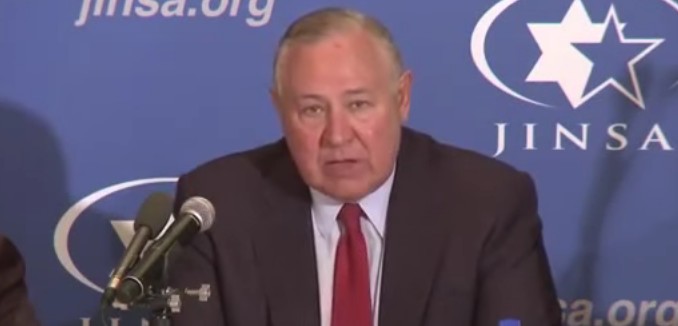A task force led by two retired four-star generals has concluded that the nuclear deal with Iran will help the Islamic Republic “become more powerful and expand its influence and destabilizing activities.”
The assessment (.pdf), led by James Conway, the former Commandant of the Marine Corps, and Charles Wald, the former Deputy Commander of United States European Command, also stated that the deal, formally known as the Joint Comprehensive Plan of Action (JCPOA), will both “give Iran the means to increase support for terrorist and insurgent proxies” and hurt America’s standing with its regional allies who see the deal “as a weakening of U.S. security guarantees and reversal of decades of U.S. regional security policy.”
A strategic assessment of the Joint Comprehensive Plan of Action (JCPOA), prepared for the Jewish Institute for National Security Affairs (JINSA) by a task force headed by former generals James Conway and Charles Wald, finds that the JCPOA will Iran “to become more powerful and expand its influence and destabilizing activities.” The assessment (.pdf) was published Wednesday. Conway is a former Commandant of the Marine Corps, and Wald is the former Deputy Commander of United States European Command.
The task force, organized by the Jewish Institute for National Security Affairs (JINSA), also concluded:
The JCPOA will give Iran the means to increase support for terrorist and insurgent proxies, aggravate sectarian conflict and trigger both nuclear and conventional proliferation cascades. It will provide the expansionist regime in Tehran with access to resources, technology and international arms markets required to bolster offensive military capabilities in the vital Persian Gulf region, acquire long-range ballistic missiles and develop other major weapons systems.
Our long-standing allies feel betrayed – even angry – with the JCPOA, seeing it as a weakening of U.S. security guarantees and reversal of decades of U.S. regional security policy. The mere fact that such perceptions persist, regardless of their veracity, will undermine U.S. credibility, threatening to turn them into a self-fulfilling prophecy.
The Washington Free Beacon reported today that Secretary of State John Kerry sent a letter to Congress today promising increased aid and security cooperation for Israel and Gulf allies.
Though the JINSA assessment noted that the United States is currently far superior to Iran militarily, its advantage—due to sequestration, which will limit the “U.S. military’s ability to project power in the region,” and the relaxing of sanctions and other restrictions on Iran, which will leave the regime “economically stronger, regionally more powerful and militarily more capable”—will diminish over the next 15 years of the agreement.
It also observed that given the narrowing of America’s military edge over Iran during the course of the agreement, it “increases both the probability and danger of hostilities with Iran.”
The report recommended the rebuilding of regional alliances that have been “frayed” by the agreement with Iran, and “to assemble a regional coalition to hold the line against Tehran.” The assessment also says that the United States must diplomatically convince Russia and China, the nations most likely to arm Iran with advanced weaponry, not to do so. The United States will also have to “develop a comprehensive strategy to deal with the entirety of Iran’s adversarial ambitions,” despite having made the re-imposition of terror-related sanctions difficult. Finally, the assessment called on the United States to raise the level of military spending to allow it to improve those capabilities “most essential to deterring – and if necessary defeating – the growing threat from Iran under the JCPOA.”
[Photo: unwatch / YouTube ]




